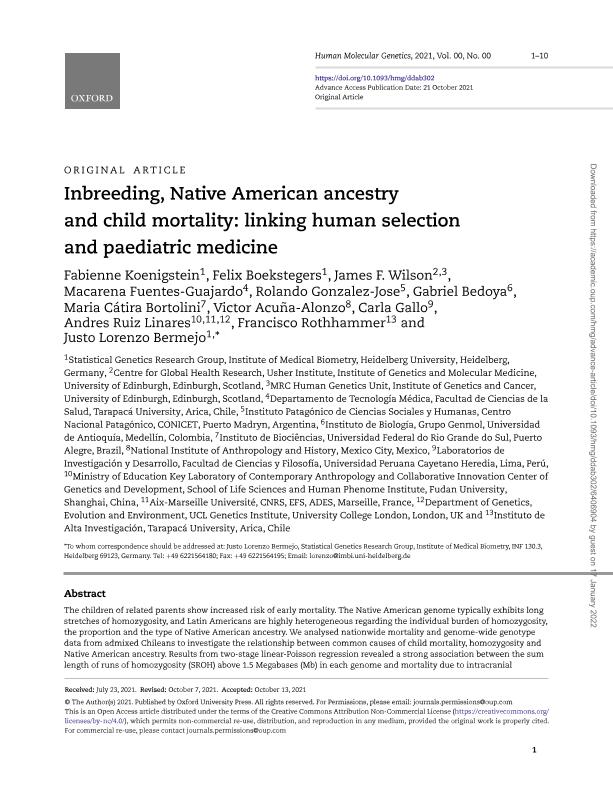Mostrar el registro sencillo del ítem
dc.contributor.author
Koenigstein, Fabienne
dc.contributor.author
Boekstegers, Felix
dc.contributor.author
Wilson, James F.
dc.contributor.author
Fuentes Guajardo, Macarena
dc.contributor.author
Gonzalez-Jose, Rolando

dc.contributor.author
Bedoya Berrío, Gabriel

dc.contributor.author
Bortolini, Maria Cátira
dc.contributor.author
Acuña Alonzo, Victor
dc.contributor.author
Gallo, Carla
dc.contributor.author
Ruiz-Linares, Andres

dc.contributor.author
Rothhammer, Francisco
dc.contributor.author
Lorenzo Bermejo, Justo
dc.date.available
2022-02-21T16:54:06Z
dc.date.issued
2021-10
dc.identifier.citation
Koenigstein, Fabienne; Boekstegers, Felix; Wilson, James F.; Fuentes Guajardo, Macarena; Gonzalez-Jose, Rolando; et al.; Inbreeding, Native American ancestry and child mortality: linking human selection and paediatric medicine; Oxford University Press; Human Molecular Genetics; 2021; 10-2021; 1-10
dc.identifier.issn
0964-6906
dc.identifier.uri
http://hdl.handle.net/11336/152389
dc.description.abstract
The children of related parents show increased risk of early mortality. The Native American genome typically exhibits long stretches of homozygosity, and Latin Americans are highly heterogeneous regarding the individual burden of homozygosity, the proportion and the type of Native American ancestry. We analysed nationwide mortality and genome-wide genotype data from admixed Chileans to investigate the relationship between common causes of child mortality, homozygosity and Native American ancestry. Results from two-stage linear-Poisson regression revealed a strong association between the sum length of runs of homozygosity (SROH) above 1.5 Megabases (Mb) in each genome and mortality due to intracranial non-traumatic haemorrhage of foetus and newborn (5% increased risk of death per Mb in SROH, P = 1 × 10−3) and disorders related to short gestation and low birth weight (P = 3 × 10−4). The major indigenous populations in Chile are Aymara–Quechua in the north of the country and the Mapuche–Huilliche in the south. The individual proportion of Aymara–Quechua ancestry was associated with an increased risk of death due to anencephaly and similar malformations (P = 4 × 10−5), and the risk of death due to Edwards and Patau trisomy syndromes decreased 4% per 1% Aymara–Quechua ancestry proportion (P = 4 × 10−4) and 5% per 1% Mapuche–Huilliche ancestry proportion (P = 2 × 10−3). The present results suggest that short gestation, low birth weight and intracranial non-traumatic haemorrhage mediate the negative effect of inbreeding on human selection. Independent validation of the identified associations between common causes of child death, homozygosity and fine-scale ancestry proportions may inform paediatric medicine.
dc.format
application/pdf
dc.language.iso
eng
dc.publisher
Oxford University Press

dc.rights
info:eu-repo/semantics/openAccess
dc.rights.uri
https://creativecommons.org/licenses/by-nc/2.5/ar/
dc.subject
INBREEDING
dc.subject
GENOMICA
dc.subject
POBLACIONES MESTIZAS
dc.subject
LATINOAMERICA
dc.subject.classification
Otras Ciencias Biológicas

dc.subject.classification
Ciencias Biológicas

dc.subject.classification
CIENCIAS NATURALES Y EXACTAS

dc.title
Inbreeding, Native American ancestry and child mortality: linking human selection and paediatric medicine
dc.type
info:eu-repo/semantics/article
dc.type
info:ar-repo/semantics/artículo
dc.type
info:eu-repo/semantics/publishedVersion
dc.date.updated
2022-02-17T13:14:20Z
dc.identifier.eissn
1460-2083
dc.journal.volume
2021
dc.journal.pagination
1-10
dc.journal.pais
Reino Unido

dc.journal.ciudad
Oxford
dc.description.fil
Fil: Koenigstein, Fabienne. Ruprecht Karls Universitat Heidelberg; Alemania
dc.description.fil
Fil: Boekstegers, Felix. Ruprecht Karls Universitat Heidelberg; Alemania
dc.description.fil
Fil: Wilson, James F.. University of Edinburgh; Reino Unido
dc.description.fil
Fil: Fuentes Guajardo, Macarena. Universidad de Tarapacá; Chile
dc.description.fil
Fil: Gonzalez-Jose, Rolando. Consejo Nacional de Investigaciones Científicas y Técnicas. Centro Científico Tecnológico Conicet - Centro Nacional Patagónico. Instituto Patagónico de Ciencias Sociales y Humanas; Argentina
dc.description.fil
Fil: Bedoya Berrío, Gabriel. Universidad de Antioquia; Colombia
dc.description.fil
Fil: Bortolini, Maria Cátira. Universidade Federal do Rio Grande do Sul; Brasil
dc.description.fil
Fil: Acuña Alonzo, Victor. Instituto Nacional de Antropología e Historia. Escuela Nacional de Antropología e Historia; México
dc.description.fil
Fil: Gallo, Carla. Universidad Peruana Cayetano Heredia; Perú
dc.description.fil
Fil: Ruiz-Linares, Andres. Fudan University; China. Aix-Marseille Université; Francia. Centre National de la Recherche Scientifique; Francia. University College London; Reino Unido
dc.description.fil
Fil: Rothhammer, Francisco. Universidad de Tarapaca. Instituto de Alta Investigación; Chile
dc.description.fil
Fil: Lorenzo Bermejo, Justo. Ruprecht Karls Universitat Heidelberg; Alemania
dc.journal.title
Human Molecular Genetics

dc.relation.alternativeid
info:eu-repo/semantics/altIdentifier/url/https://academic.oup.com/hmg/advance-article/doi/10.1093/hmg/ddab302/6406904
dc.relation.alternativeid
info:eu-repo/semantics/altIdentifier/doi/http://dx.doi.org/10.1093/hmg/ddab302
Archivos asociados
